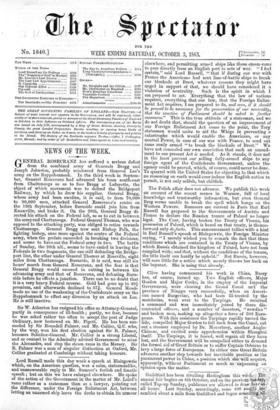Lord Russell made this day week a speech at Blairgowrie
which, on the American question, was a calm, statesmanlike, and unanswerable reply to Mr. Sumner's foolish and fanatic speech ; but on this we have enlarged elsewhere. He spoke of the action of the Government in the matter of Mr. Laird's rams rather as a statesman than as a lawyer, pointing out the difference, under the Foreign Enlistment Act, between letting an unarmed ship leave the docks to obtain its armour elsewhere, and permitting armed ships like these steam-rams to pass directly from an English port to acts of war. "I feel 2576 certain," said Lord Russell, "that if during our war with France the Americans had sent line-of-battle ships to break our blockade at Brest, whatever reasons they might have urged in support of that, we should have considered it a violation of neutrality. Such is the spirit in which I am prepared to act. Everything that the law of nations requires, everything that our law, that the Foreign Enlist- ment Act requires, I am prepared to do, and even, if it should be proved to be necessary for the preservation of our neutrality, that the sanction of Parliament should be asked to further measures." This is the true attitude of a statesman, and we do not doubt that, should the question of an improvement of our Foreign Enlistment Act come to the point, the Tory statesmen would unite to aid the Whigs in preventing a catastrophe which would enable the Americans, or any neutral Power, in ease of our war with France, to send out rams ready armed "to break the blockade of Brest." We have not concealed our own conviction that such an amend- ment to our present Act is needed. As it stands, it does not in the least prevent our "Jelling fully-armed ships to any foreign agent of the Confederate Government, unless the agency could- be proved, which, of course, could never be done. To quarrel with the United States for objecting to that which no reasoning on earth would ever induce the English nation to permit, is not only selfish, but childish.






























